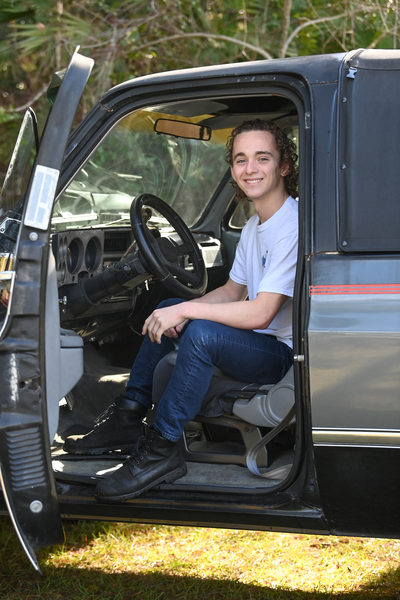Computer science major wins the 2023 AI For Good Hackathon
At age 19, Hunter Ford is mature beyond his young age.
The University of North Florida junior majoring in computer science is a huge fan of watching YouTube videos to learn coding, likes to build things from scratch and is a self-professed multitasker who doesn’t like idle time.
 A Jacksonville native, who graduated from Douglas Anderson School of the Arts High School in 2022, Ford enrolled at UNF as a sophomore in August 2022 after earning college credit in high school.
A Jacksonville native, who graduated from Douglas Anderson School of the Arts High School in 2022, Ford enrolled at UNF as a sophomore in August 2022 after earning college credit in high school.
He has a myriad of interests ranging from tinkering with computers and coding to photography, building drones, tending to his antique truck and embroidering on his grandmother’s embroidery machine. He says blending his schoolwork with his hobbies is a natural fit for him and makes for an exciting life.
Last November, Ford was named winner of the 2023 AI For Good Hackathon — a 48-hour, weekend competition that challenges teams of students to find solutions that drive social and environmental changes — even though he missed a full-day of competition due to a conflict.
“I had a previous commitment to take photos at an event before I signed up for the Hackathon and was gone all day Saturday,” explained Ford. “But I felt confident I could still finish up the competition when I got back.”
Indeed, he did, winning the top prize of $500.
Working independently, Ford returned to his UNF dorm later on the second day of competition, worked through the night and into early Sunday morning and produced a PowerPoint presentation for the judges Sunday morning.
For the competition, participants were presented with case studies posed by organizations. Ford chose to take on Ponte Vedra-based nonprofit First Tee — a national youth development organization that promotes and builds life skills such as strength of character and confidence by offering free golf lessons to kids up to age 18 — who wanted to expand their reach around the U.S., including accessibility to underserved communities.
Ford used artificial intelligence to display optimized potential locations throughout the U.S., by gathering zip codes and focusing on residential areas with a median income of $30,000 or less. After locating several sites, he documented his research and offered recommendations on accessibility for families with kids as well as other logistical information.
“The [AI For Good] Hackathon competition was a good experience,” Ford said, who is interning at UNF’s Data Science department. “I made a few professional contacts that may lead to a job one day, and the Tutoring Center asked if I could tutor Data Science and Computer Science students.”
His favorite classes are the ones that involve hands-on learning like an English class he took last year.
“I would have never thought I needed to know how to sew for an English class,” Ford said. “The professor told us to sew a kite, attach a go-pro camera to take photographs and load it into a virtual reality game. Our assignment was to write a technical paper on our project — from start to finish and all the steps in between. It was one of my best classes.”
Looking ahead, Ford said he’s planning on continuing his education with a master's in computer science and says his dream job is to work for Boston Dynamics or the Department of Defense.
